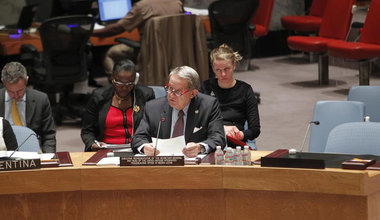STATEMENT ON WORLD HEPATITIS DAY PRESS BRIEFING DELIVERED BY DR PAMELA MITULA/WHO EPI TEAM LEADER
July 28, 2011, marks the first official World Hepatitis Day established by the World Health Organization (WHO) to increase the awareness and understanding of viral hepatitis and the diseases that it causes. It provides an opportunity to focus on specific actions such as: strengthening prevention, screening and control of viral hepatitis and its related diseases; increasing hepatitis B vaccine coverage and integration into national immunization programmes; and coordinating a global response to hepatitis.
Hepatitis is an inflammation of the liver, most commonly caused by a viral infection. There are five main hepatitis viruses; types A, B, C, D and E which can cause illness and death as well as the potential for outbreaks and epidemic spread. In particular, types B and C lead to chronic disease such as liver cirrhosis and cancer.
Hepatitis A and E are typically caused by ingestion of contaminated food or water. Hepatitis B, C and D usually occur as a result of contaminated injections with infected body fluids, and is commonly transmitted through contaminated blood or blood products, invasive medical procedures using contaminated equipment and for hepatitis B transmission from mother to baby at birth, from family member to child, and also by sexual contact.
Acute hepatitis infection may occur with limited or no symptoms, or may include symptoms such as jaundice (yellowing of the skin and eyes), dark urine, extreme fatigue, nausea, vomiting and abdominal pain. Early diagnosis provides the best opportunity for effective medical support
Hepatitis is a global health problem causing about 1 million deaths per year. Nearly one out of every three people in the world (approximately 2 billion people) has been infected by Hepatitis B.78% of liver cancer worldwide are caused by types B and C. Most people infected with these viruses are unaware of their infection, but face the possibility of developing liver disease in future as well as unknowingly transmitting the infection to others.
At its 2010 meeting, the World Health Assembly resolved that July 28 should be designated as World Hepatitis Day. World Hepatitis Day is set aside to provide an opportunity for education and greater understanding of viral hepatitis as a global public health problem, and to stimulate the strengthening of preventive and control measures of this disease by nations around the world.
Hepatitis A and B could be prevented by vaccination. All infants should receive the Hepatitis B vaccine which is the mainstay of Hepatitis B prevention. Screening blood used for transfusion can prevent transmission of Type B and C. Use of sterile injection equipment protects against type B and C transmission. Safer sex practices, including minimizing the number of partners and using barrier (condom) protective measures has been shown to protect against Type B and C transmission. Safe food and water, free from contamination protects against Types A and E.
WHO is assisting in ensuring the safety, availability, and quality of blood and blood products, injection safety, immunization and strengthening disease surveillance. In Sierra Leone, hepatitis B vaccine is part of the routine immunization programs (pentavalent vaccine).
To accomplish this mandate, WHO will take a health systems approach, including developing new approaches at WHO and mobilizing much needed resources.
WHO will work in close collaboration with all our partners to prevent and control viral hepatitis.
Thank you.
 UN
UN




